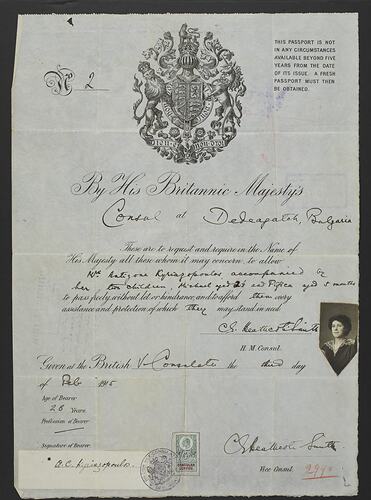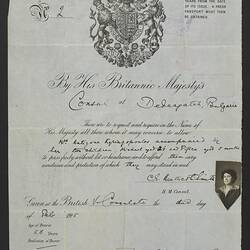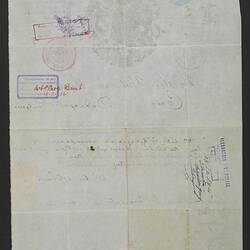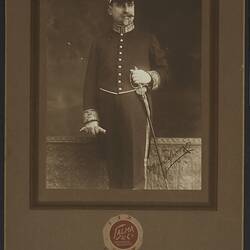Summary
Passport issued by the British Consulate in Bulgaria to Antigoni Kyriazopoulos on 3 February, 1915.
She is recorded as being 28 years of age at the time and accompanied by her two children, Michael (aged two and a half) and Fifica (aged 5 months). The document includes a half portrait photograph of Antigoni. Antigoni had returned home to Andrianople in 1914, having promised her father to report on conditions in Australia. Her son Michael accompanied her but her husband Constantine remained in Melbourne. She returned to Melbourne on the last ship leaving at the outbreak of World War I.
Antigoni Dimissa migrated to Australia from Greece in 1909 to marry Constantine Kyriazopoulos, a doctor who had arrived in Melbourne in 1902. They were from a similar part of Greece and knew each other before migrating. Antigoni, a well educated woman, became active in Melbourne's cultural, social and fund-raising life.
Significance
This collection holds enormous social and cultural significance for the state collection. Its value lies in its breadth of material (textiles, documents, tools and equipment, and photographs) and strength of its provenance. The story and the objects which belonged to Dr Constantine and Antigoni Kyriazopoulos enable the museum to both represent and explore key themes, including early 20th century, non-British migration; professional rather than the more common labour and trades category of male migration; early 20th century social and cultural life in Melbourne; female agency is creating migrant support networks; examples of individual discrimination in early 20th century Australia; and the maintenance and adaptation of a cultural identity through the process of migration and settlement.
The documents relate to the doctor's working life (business cards, letterhead and invoice, medical congress identity tag, professional qualifications certificate and diploma), his ongoing connections to Greek cultural life (Greek play booklets and periodicals), his position as Greek Consul (Victorian Government gazette announcement and Consul letterhead) and his decision to change his surname (deed poll), a common migrant experience. There is also a rare passport belonging to Antigoni demonstrating her return passage to Melbourne.
The clothing items, particularly the Greek consul uniform is an excellent example of active and visible cultural maintenance, as well as official recognition. The women's clothes and accessories (dresses, jackets, gloves, bags, belts) are significant as strong examples of their period, and as examples of clothing (procured both in Melbourne and in Greece) worn by affluent women of non-Anglo background in Melbourne in the 1910s and 20s. The collection of underclothes augment the museum growing collection of women's trousseaux which ranges across time and culture.
The medical case, brass plaque and medical tools offer tangible evidence of the doctor's professional tools of trade from this early period while the uniform and flags enable the representation of Consul activity in early 20th century Melbourne,
More Information
-
Collecting Areas
-
Acquisition Information
Cultural Gifts Donation from Mrs Fife Denovan, 14 Mar 2012
-
Date Issued
-
Issued To
-
Format
Photograph, Black & White
-
Classification
-
Category
-
Discipline
-
Type of item
-
Keywords
Greek Communities, Greek Immigration, Identifications, Travel



